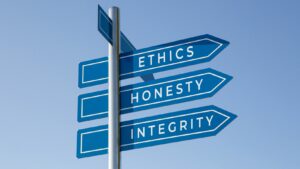Media Ethics: Key Principles for Responsible Practice
- Understanding Media Ethics: Media ethics is essential for guiding journalists and content creators, ensuring responsible conduct and representation in media practices.
- Core Principles: Key ethical principles include truthfulness, accuracy, independence, objectivity, fairness, and impartiality, which serve to uphold credibility and trust in media.
- Challenges Faced: Media professionals must navigate significant challenges such as misinformation, fake news, and conflicts of interest, which threaten ethical reporting and public trust.

- Importance of Ethical Codes: Media organizations establish ethical codes and standards to provide guidelines and accountability for responsible journalism and content creation.
- Continuous Education: Ongoing training and education in media ethics are crucial for journalists, enhancing their ability to address ethical dilemmas and adapt to evolving challenges in the industry.
In an age where information spreads at lightning speed, understanding media ethics is more crucial than ever. Journalists and content creators face the challenge of balancing truth, integrity, and public interest while navigating an increasingly complex digital landscape. Adhering to key ethical principles not only fosters trust but also enhances the credibility of media organizations.
Responsible media practice hinges on transparency, accountability, and respect for the audience. By embracing these core values, professionals can ensure their work contributes positively to society. This article explores essential media ethics principles that guide responsible reporting and content creation, helping media practitioners maintain high standards in their work.
Understanding Media Ethics
Media ethics encompasses the principles and standards guiding the conduct of media professionals. It shapes the practice of journalism and content creation, ensuring responsible reporting and representation.
Definition of Media Ethics
Media ethics refers to the moral principles that dictate how media practitioners should operate. It includes guidelines on issues like honesty, fairness, and integrity in the dissemination of information. Ethical decision-making in media involves evaluating potential impacts on society and individual rights, fostering a commitment to truthfulness and respect.
Importance of Media Ethics
Media ethics plays a crucial role in maintaining public trust in media organizations. Ethical practices lead to credible reporting, which is essential for an informed society. By prioritizing accuracy and transparency, media professionals uphold their responsibility to the audience, facilitating informed decision-making among readers and viewers. Moreover, adherence to ethical standards protects against misinformation and undue influence, ultimately enhancing the quality of journalism and content dissemination.
Key Principles of Media Ethics
Media ethics relies on foundational principles that guide professionals in their reporting and content creation. These principles help ensure that media remains a credible and trustworthy source of information.
Truthfulness and Accuracy
Truthfulness and accuracy form the core of ethical media practices. Reporting must reflect verified facts and proper context. Journalists verify information through reliable sources, ensuring that facts are presented correctly and without distortion. For instance, checking multiple sources before publishing minimizes the risk of spreading misinformation. All claims require substantiation, emphasizing the importance of thorough fact-checking processes.
Independence and Objectivity
Independence and objectivity serve as essential elements for ethical media. Media professionals should remain free from external pressures, including political or commercial influences. This independence allows them to report objectively without bias. Maintaining this stance involves disclosing potential conflicts of interest to the audience, thereby fostering trust in their work. For example, journalists should refrain from accepting gifts or favors from sources that could jeopardize their impartiality.
Fairness and Impartiality
Fairness and impartiality ensure that multiple viewpoints receive equitable representation. Ethical media practitioners avoid favoritism, providing a balanced portrayal of issues. This principle requires journalists to include diverse perspectives, particularly those from marginalized groups, to present a more inclusive narrative. Quote attribution and acknowledgment of differing opinions enhance the credibility of the report. By practicing fairness and impartiality, media professionals contribute to a well-informed public discourse.
Challenges in Media Ethics
Media professionals face significant challenges that threaten ethical practices. Misinformation and conflicts of interest significantly impact the credibility of media organizations.
Misinformation and Fake News
Misinformation and fake news undermine the core of media ethics. Misinformation refers to false or misleading information spread without malicious intent, while fake news consists of deliberately fabricated stories. The rapid spread of false information, particularly through social media platforms, affects public perception and trust. Media practitioners must verify facts rigorously, utilize credible sources, and implement clear verification processes. The consequences of failing to address misinformation include diminished audience trust and increased polarization in public discourse.
Conflicts of Interest
Conflicts of interest pose another ethical challenge in the media landscape. A conflict arises when a media professional’s personal interests compromise their professional judgment. Relationships with political entities, financial interests, or affiliations can influence reporting and distort content. To address conflicts of interest, media professionals must disclose any affiliations and avoid producing content that could compromise their objectivity. Adherence to robust conflict-of-interest policies and maintaining a clear separation between personal beliefs and professional responsibilities helps protect the integrity of reporting.
The Role of Media Organizations
Media organizations play a crucial role in upholding ethical standards within journalism and content creation. By prioritizing these principles, they foster trust, accountability, and a commitment to responsible reporting.
Ethical Codes and Standards
Media organizations establish ethical codes and standards to guide their practices. These codes often include principles such as truthfulness, accuracy, and minimizing harm. For instance, the Society of Professional Journalists (SPJ) Code of Ethics outlines specific guidelines for journalists, emphasizing the importance of fair and thorough reporting. Various organizations adapt these codes to fit their specific contexts, ensuring relevance to their audience. Implementing these standards creates a framework that encourages accountability, supports transparency, and helps media professionals navigate ethical dilemmas.
Training and Education in Media Ethics
 Training and education in media ethics form an essential part of responsible journalism practices. Media organizations often provide workshops, seminars, and continuing education courses focused on ethical decision-making and dilemmas. Such training enhances journalists’ skills in identifying potential ethical challenges and applying appropriate solutions. Incorporating ethics into formal journalism education ensures that upcoming professionals understand the significance of these principles. Furthermore, ongoing education programs keep practitioners informed about evolving ethical landscapes, protecting the integrity of media organizations and their commitment to serving the public.
Training and education in media ethics form an essential part of responsible journalism practices. Media organizations often provide workshops, seminars, and continuing education courses focused on ethical decision-making and dilemmas. Such training enhances journalists’ skills in identifying potential ethical challenges and applying appropriate solutions. Incorporating ethics into formal journalism education ensures that upcoming professionals understand the significance of these principles. Furthermore, ongoing education programs keep practitioners informed about evolving ethical landscapes, protecting the integrity of media organizations and their commitment to serving the public.
Journalism and Content Creation
Media ethics play a critical role in shaping responsible journalism and content creation. By adhering to key principles like truthfulness accountability and fairness media professionals can significantly enhance public trust and credibility. As the digital landscape continues to evolve the importance of ethical practices cannot be overstated.
Training and education in media ethics are essential for equipping journalists with the skills to navigate complex ethical dilemmas. By fostering a culture of transparency and integrity media organizations not only protect their reputation but also contribute to a more informed society. Upholding these ethical standards is vital for ensuring that the media remains a reliable source of information in an era fraught with misinformation and bias.

